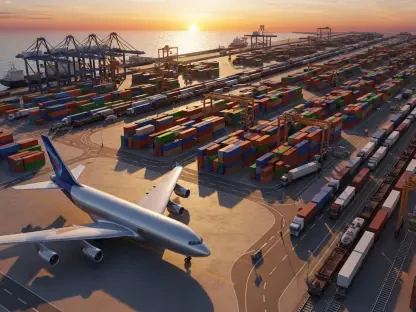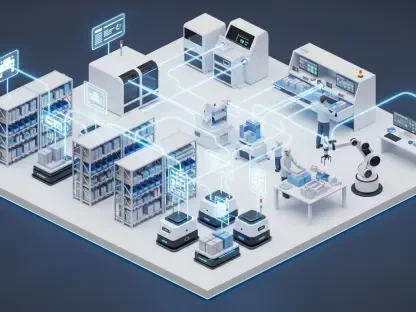Blockchain technology, traditionally the driving force behind cryptocurrencies, is rapidly transforming the logistics industry. This innovative tech is being harnessed to reshape supply chain management, offering a new level of transparency, efficiency, and security that was previously unattainable. As demand for these advanced logistics solutions surges, a multitude of service providers is emerging, each proposing unique blockchain applications to meet this need.The influence of blockchain on logistics is multifaceted. It provides an immutable ledger, which can track goods from their origin to their final destination, ensuring product authenticity and reducing instances of fraud. The technology also streamlines operations by automating contracts and payments, reducing bottlenecks that typically slow down the logistics process.What’s truly revolutionary is blockchain’s ability to connect various stakeholders in the supply chain, such as manufacturers, carriers, and retailers, onto one transparent and secure platform. This interconnectedness facilitates real-time information sharing, enabling more accurate forecasting and inventory management.As blockchain continues to infiltrate the logistics realm, it’s anticipated that these top 10 service providers will lead the charge in establishing a new era for supply chain management. Their solutions are not only changing how goods are tracked and traded but are also setting the stage for a more reliable and straightforward global trade.
The Rising Demand for Blockchain in Logistics
In the shadow of a fluctuating global economy, logistics has towered as a beacon of operational efficacy or inefficiency. Embattled with inflation, businesses have turned their gazes towards technologies that pare down the costs of goods and services while enhancing performance. Blockchain technology, with its promise of creating an immutable, transparent ledger, has emerged as a leading solution. It showcases an unmatched ability to streamline operations, bolster product tracking, and augment overall logistics networks. Blockchain’s lure in logistics lies in decentralization. By enabling a peer-to-peer network that dispenses with intermediary oversight, supply chains are invigorated with newfound precision. Real-time data access spearheads the opportunity for companies to orchestrate their logistical maneuvers with pinpoint accuracy. These advantages are not only reshaping efficiency metrics but also cultivating consumer trust through evident product authenticity and provenance.
Profiling the Top Blockchain Logistics Providers
As blockchain burgeons within the logistics realm, transformative service providers have etched their names as pioneers. These front-runners are not iterating on pre-existing blockchain platforms; instead, they craft solutions customized for the nuances of logistics. Their influence is manifold: they’re recalibrating the expectations of supply chain services and championing an overhaul that blends modern technology with logistical lore.The technologies and strategies employed by these service providers resonate with the core needs of the industry. They represent a robust solution set that ranges from the intricacies of small business needs to the sprawl of global corporations. This profile of innovators is a testament to the scalable and adaptable nature of blockchain as a bedrock for logistical renovations.
Innovators on the Frontlines: Top Blockchain Service Providers
At the helm of the transformation lies a cohort of innovators, each presenting a suite of blockchain tools designed to fine-tune the logistics machinery. Names like Yojee and IBM Food Trust are syntheses of blockchain with AI, forging efficiency trails that were once but speculative pathways. On the other hand, entities such as VeChain and Provenance bring to the fore real-time tracking capabilities, ensuring that every step in the supply chain is accounted for and authenticated.Their offerings run deep, bringing forth subtleties like IoT integration and smart contracts. Peer-to-peer models for direct negotiation and enforcement of logistics agreements, multi-blockchain operations consolidating disparate records, and tokenized documentation for the shipping industry comprise a fraction of what these innovators contribute. The diversity in applications reflects an ecosystem ripe for adaption, catering to varied market segments with precision.
The Operational Benefits and Global Impact
Blockchain technology transcends mere cost-saving in logistics; it fundamentally transforms product lifecycle management, bolsters safety, and cultivates trust among consumers. Its effects permeate the entirety of global supply chains, bringing substantial and widespread change.The implementation of blockchain can significantly diminish food wastage through more efficient returns processes, while its ability to track the provenance of items such as diamonds enhances ethical practices by verifying they are conflict-free. In markets dealing in precious commodities like gold and silver, blockchain provides a level of assurance that solidifies market trust.Companies employing blockchain are not just suppliers; they are pioneers, steering a significant shift in how logistics systems operate. They build frameworks that are not only resilient and reliable but also deeply integrated with the reliability of blockchain technology.By leveraging blockchain, enterprises can achieve transparent, immutable records of transaction and product journeys from origin to end-user. This transparency transforms the approach to supply, demand, and the authentication of goods. As this technology grows more ingrained in our logistical systems, it promises to usher in an era of streamlined operations that prioritize integrity, efficiency, and the environment. This is not just a fleeting trend; it’s a comprehensive overhaul of our supply chain infrastructure that will have lasting effects for years to come.
The Future of Blockchain Logistics and Business Systems
Blockchain technology, increasingly pivotal in modern supply chain management, is set to expand and innovate further. It faces challenges like scaling, adapting to shifting regulations, and handling complex data. As industry leaders, service providers play a key role in ensuring a smooth transition into this new era.Future growth will depend on handling regulatory requirements, developing scalable blockchain solutions, and fostering rich data ecosystems. Service providers are on the frontier, pushing the boundaries of what’s possible. The question isn’t if blockchain will become a core component of business infrastructure—it’s about how significantly it will transform logistics.As we move forward, blockchain will likely become central to logistics, offering unmatched transparency, efficiency, and security. It holds the promise of drastically reducing fraud, errors, and costs, while improving inventory management and demand forecasting. The technology’s potential impact on logistics is vast, promising a revolutionized industry that is more coordinated, integrated, and forward-looking than ever before.









